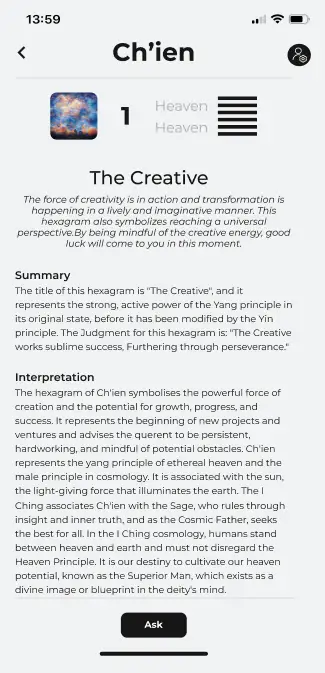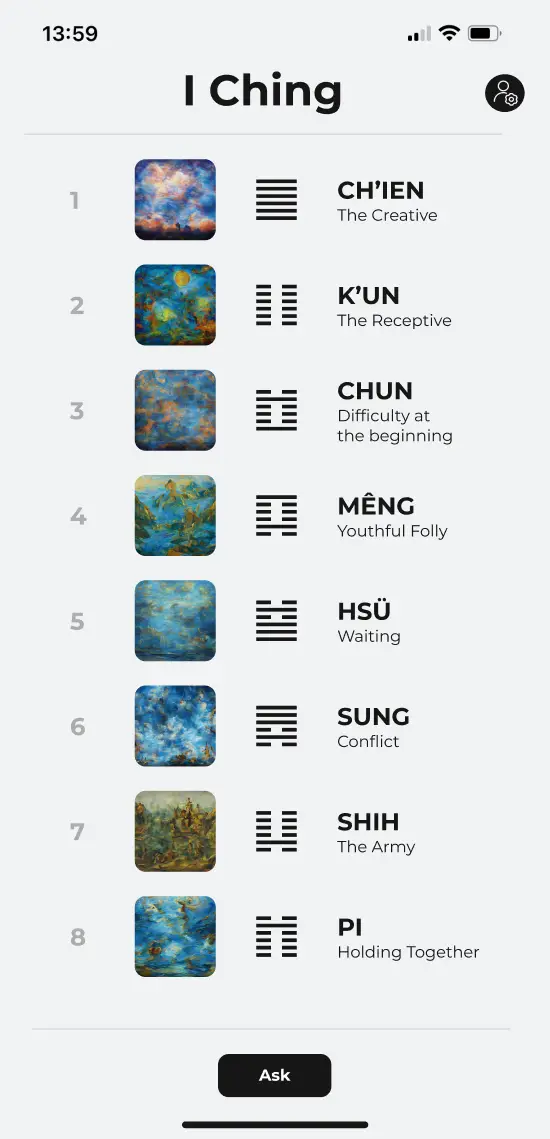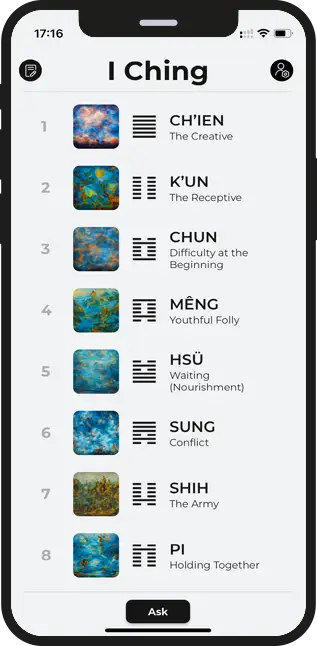
Fire
Fire
Hexagram 30 - The Clinging Fire - LI
We gain a balanced and impartial perspective through practising detachment and acceptance. By holding onto the strength of higher truth, we can avoid becoming overly attached or emotionally swayed by external circumstances.
Summary
Represents the idea of clinging to something, whether it is a person, a situation or an idea. It also represents the idea of fire, which can be both destructive and illuminating. The key takeaways from the judgment and image of this hexagram are to let go of what is no longer serving you and to be open to new opportunities.
Interpretation
To acquire true spiritual clarity, we must practice detachment and acceptance. By clinging to the power of higher truth, we can emerge with a moderate and just view of things. The image of fire in this hexagram symbolises the attitude we need to attain and keep the clarity of mind. We must cling to something that is not easily exhausted, and the inexhaustible truth we discover in our study of the I Ching can provide that. This hexagram encourages us to be adaptable and open-minded to navigate the changes that come with letting go. It advises against becoming too attached to material possessions and wealth and suggests being content with what we have instead of constantly seeking more. It also warns against being too attached to a particular way of thinking or doing things, encouraging us to be open to new perspectives and ways of thinking.
When dark powers of doubt threaten, we should cling to what we have learned and trust the power of truth to prevail. We must turn everything over to the Sage and attend only to keeping doubt dispersed and our attitude independent and balanced. Docility and detachment are the only correct responses to challenges we face, and it is essential to persevere through moments of potential wavering. By clinging to what is good in ourselves and others, we can keep disengaged from the inferior power and enable the dark force to be overcome.
The best advice from this hexagram is to be aware of potential dangers, to be prepared for unexpected challenges, and to approach all situations with humility and caution. We should cling to proper principles, quietly and joyfully, and be open to new opportunities. We can meet with success by deepening our devotion to moral principles, adhering to truth and acceptance, and being independent.
Sage Advice
Accepting adversity as a necessary part of growth and development. According to the I Ching, the hexagram represents "The Clinging Fire," symbolising the inner strength and steadfastness that arises from being connected to one's inner truth and purpose. The message of this hexagram is to remain grounded in one's inner truth while being open and receptive to the universe's guidance. In the face of difficulties, it is essential to resist the urge to be swayed by external factors and to remain steadfast in one's inner principles. This requires a deep sense of humility and respect for the natural order of things. The I Ching advises against being too aggressive or pushy in pursuing one's goals, as this can lead to losing inner clarity and balance.
Ultimately, the key to success lies in persevering through difficult times and staying true to one's inner light. This involves cultivating a sense of inner strength and resilience and a willingness to accept the challenges that life presents. By doing so, we can tap into the power of the universe and realize our full potential as human beings.
Line 1
Emphasises the importance of being mindful and aware of our thoughts and behaviours from the beginning. It advises us to take the time to pause and reflect before acting to ensure that our actions and decisions are based on a foundation of correct principles. By maintaining a composed and proper attitude, we can avoid the misfortunes resulting from rushing into things with incorrect thoughts or behaviours. This line serves as a reminder to start things off on the right foot and to set the tone for success through careful and deliberate action.
Line 2
Advises us to practice moderation in all things, as represented by the image of yellow light. This moderation applies to our emotional responses to both good and bad situations. We should strive to maintain a balanced and level-headed perspective, not becoming overly enthusiastic in good times or excessively despairing in bad times. Doing so can deepen our understanding and avoid becoming emotionally unbalanced. Furthermore, the line reminds us not to let negative experiences cause us to become hardened or inflexible in our interactions with others. Instead, we should listen to our inner truth and act with conscientiousness and understanding.
Line 3
The best approach is to embrace the present moment and not worry about what may come or has passed. If we cling to expectations and desires, we create unnecessary stress and limit our ability to be fully present. We can remain free and at peace by being open to what is. Line 3 warns against the dangers of being attached to specific outcomes or timeframes. It advises us to trust in life's natural flow and avoid placing pressure on ourselves or others. When we release our expectations and allow things to unfold naturally, we open ourselves up to greater opportunities for growth and fulfilment.
Line 4
Success requires perseverance and patience, even when our inferiors complain and create doubts. It is vital to silence these negative voices and refuse to engage in their obsessive preoccupation with difficulties. By explaining the counterproductive effects of their activity, we may overcome their resistance and restore clarity and steadfastness. The key is to maintain a steady mind and heart without allowing worry and agitation to slow down our progress. The image of the flame that flames up dies down, and is thrown away suggests that worry is a consuming fire that needs to be extinguished for success to be possible. This line warns against the negative influence of complaining inferiors who create doubts and hinder progress. It advises them to silence these voices and refuse to engage in their obsessive preoccupation with difficulties.
Line 5
Suggests that a significant shift in attitude has occurred, either within ourselves or in someone else. This change of heart can be achieved by accepting the necessity of facing difficulties and approaching them with humility. It requires letting go of vain considerations and fears, such as the fear of ageing or being alone. By doing so, we can free ourselves from the limitations of the ego, which often obstruct our progress. The change of heart also involves letting go of the desire to manipulate our situations through artificial means. Instead, we must embrace sincerity and return to the correct path. This shift in attitude brings peace and a greater sense of inner harmony. It allows us to see things more clearly and to approach life's challenges with greater wisdom and acceptance.
Line 6
Advises that it is best to kill the leaders. The leaders referred to are the evilest ringleaders of disorder in the personality: vanity and pride. These aspects of the ego can cause great harm and must be subdued for actual progress to be made. Vanity is often evident when our decisions and actions concern the way others see us. It can cause us to engage in several undesirable behaviours, such as comparing ourselves to others, seeking inside knowledge or special privileges, or feeling rejected and alone. We may also become impatient, angry, or vindictive when our pride is wounded. Both vanity and pride stem from the spoiled child within us, always seeking to gain the attention and approval of others. This part of us dislikes waiting and often pressures us to achieve measurable progress quickly. It also distrusts the help of the cosmos and seeks to accomplish everything on its own. To combat these aspects of the ego, we must first recognise them for what they are. Vanity and pride are not always visible as one entity but can manifest in several ways. We may feel envy, fear, and doubt or become impatient and defensive when our progress is slow. These emotions can cause us to lose sight of our inner independence and forget that the cosmos is at work putting things right. One way to counteract vanity and pride is through simple self-acceptance. By accepting ourselves, we can reduce the pressure we put on ourselves to achieve more quickly or impress others. This can help us remain steady and tolerant rather than becoming narrow and steep in our thinking. Ultimately, we must be resolute in apprehending our negative emotions when they arise. By doing so, we can resist their pressures and block their negative energies, freeing ourselves from ego constraints. When we successfully fight evil, we must also be careful not to become the martyred good person, which is yet another form of vanity.








